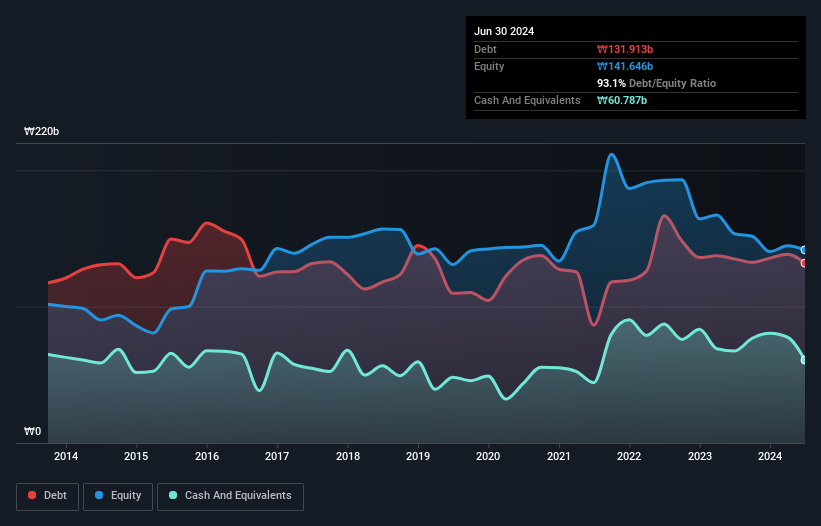- South Korea
- /
- Electronic Equipment and Components
- /
- KOSDAQ:A045970
Health Check: How Prudently Does CoAsia (KOSDAQ:045970) Use Debt?
Warren Buffett famously said, 'Volatility is far from synonymous with risk.' It's only natural to consider a company's balance sheet when you examine how risky it is, since debt is often involved when a business collapses. We note that CoAsia Corporation (KOSDAQ:045970) does have debt on its balance sheet. But should shareholders be worried about its use of debt?
What Risk Does Debt Bring?
Generally speaking, debt only becomes a real problem when a company can't easily pay it off, either by raising capital or with its own cash flow. Ultimately, if the company can't fulfill its legal obligations to repay debt, shareholders could walk away with nothing. However, a more common (but still painful) scenario is that it has to raise new equity capital at a low price, thus permanently diluting shareholders. Of course, plenty of companies use debt to fund growth, without any negative consequences. The first thing to do when considering how much debt a business uses is to look at its cash and debt together.
See our latest analysis for CoAsia
What Is CoAsia's Debt?
The chart below, which you can click on for greater detail, shows that CoAsia had ₩131.9b in debt in June 2024; about the same as the year before. However, it does have ₩60.8b in cash offsetting this, leading to net debt of about ₩71.1b.

How Healthy Is CoAsia's Balance Sheet?
The latest balance sheet data shows that CoAsia had liabilities of ₩188.7b due within a year, and liabilities of ₩25.6b falling due after that. Offsetting this, it had ₩60.8b in cash and ₩32.7b in receivables that were due within 12 months. So its liabilities outweigh the sum of its cash and (near-term) receivables by ₩120.9b.
This is a mountain of leverage relative to its market capitalization of ₩129.4b. This suggests shareholders would be heavily diluted if the company needed to shore up its balance sheet in a hurry. There's no doubt that we learn most about debt from the balance sheet. But you can't view debt in total isolation; since CoAsia will need earnings to service that debt. So when considering debt, it's definitely worth looking at the earnings trend. Click here for an interactive snapshot.
Over 12 months, CoAsia made a loss at the EBIT level, and saw its revenue drop to ₩371b, which is a fall of 6.8%. That's not what we would hope to see.
Caveat Emptor
Over the last twelve months CoAsia produced an earnings before interest and tax (EBIT) loss. Indeed, it lost a very considerable ₩21b at the EBIT level. Considering that alongside the liabilities mentioned above does not give us much confidence that company should be using so much debt. So we think its balance sheet is a little strained, though not beyond repair. However, it doesn't help that it burned through ₩3.0b of cash over the last year. So suffice it to say we do consider the stock to be risky. When analysing debt levels, the balance sheet is the obvious place to start. But ultimately, every company can contain risks that exist outside of the balance sheet. Case in point: We've spotted 4 warning signs for CoAsia you should be aware of, and 1 of them is potentially serious.
If you're interested in investing in businesses that can grow profits without the burden of debt, then check out this free list of growing businesses that have net cash on the balance sheet.
New: AI Stock Screener & Alerts
Our new AI Stock Screener scans the market every day to uncover opportunities.
• Dividend Powerhouses (3%+ Yield)
• Undervalued Small Caps with Insider Buying
• High growth Tech and AI Companies
Or build your own from over 50 metrics.
Have feedback on this article? Concerned about the content? Get in touch with us directly. Alternatively, email editorial-team (at) simplywallst.com.
This article by Simply Wall St is general in nature. We provide commentary based on historical data and analyst forecasts only using an unbiased methodology and our articles are not intended to be financial advice. It does not constitute a recommendation to buy or sell any stock, and does not take account of your objectives, or your financial situation. We aim to bring you long-term focused analysis driven by fundamental data. Note that our analysis may not factor in the latest price-sensitive company announcements or qualitative material. Simply Wall St has no position in any stocks mentioned.
About KOSDAQ:A045970
CoAsia
An investment holding company, provides system solutions in South Korea and internationally.
Flawless balance sheet with low risk.
Similar Companies
Market Insights
Community Narratives



